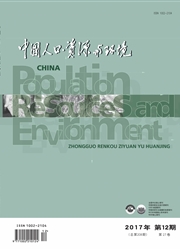

 中文摘要:
中文摘要:
污染从城市向农村的转移加剧了农村生态环境问题,已经成为制约农村经济发展的主要瓶颈之一。城乡污染转移是城乡经济主体为实现自身利益相互博弈的结果,本质是一个政治经济学问题。本文利用政治经济学研究方法,分别剖析了城乡家庭、企业和政府的利益诉求及其在污染问题中的行为选择,解释了城乡污染转移的可能性和必然性,在此基础上进一步研究了污染转移所导致的利益悖论,并对悖论形成的深层原因进行挖掘,进而提出城乡污染协同治理的政策建议。研究表明,城乡污染转移表面上看是经济主体利益最大化的理性选择:农村家庭受经济发展水平、信息获取能力和政策影响能力的限制,更注重短期经济利益而忽略长期环境利益;乡镇企业和污染企业对经济利益的追逐加快了城乡污染转移;地方政府为实现当地区域利益所采取的重城市轻乡村战略和政府之间的利益冲突也为污染转移提供了助力。事实上,城乡污染转移违背了经济发展的一般规律,形成污染转移的利益’障论:转移到农村的污染危害农业生产、进而损害城乡人力资本,有悖于长期经济增长;加剧农村生态资源退化、扩大城乡差距,有’障于区域协调发展;污染转移是城市对农村、当代人对后代人环境容量的剥削,有悖于环境的公平。认为:经济主体长期利益和短期利益的矛盾、城乡区域利益和整体利益的冲突以及制度供给不足和制度监管缺位是造成污染转移悖论的深层原因。在此基础上,提出了化解污染转移悖论的对策建议:统筹规划,实现长期利益和短期利益的统一;整合城乡,促进区域利益和整体利益协同;强化制度创新,完善制度供给;完善制度监管,提高执行效率;促进技术创新,减少污染排放。
 英文摘要:
英文摘要:
The rural ecology is being worsened by pollutants transferred from urban areas and that has become one of the major constraints against rural economic development. The pollution transfer aforementioned is the result of mutual competition between urban and rural economic entities out of each one' s interests, so it' s essentially a political economic issue. Adopting the research method of political economics, this paper will analyze the interest demands of rural and urban families, enterprises, and local governments as well as their behavioral choice when facing pollution issues, and then explain the possibility and inevitability of urban-rural pollution transfer ; on the above basis, it further studies the interest paradox caused by urban-rural pollution transfer while digging the underlying reasons for the paradox, and proposes suggestions on the policies of collaborative pollution control in both urban and rural areas at last. Research shows that it seems to be the result of rational choice of urban and rural economic entities to maximum their benefits. Being affected by the economic position, the ability of gaining information and the restriction of policy impact, rural families pay more attention to short-term financial gains than long-term environmental interests. The behavior of rural and pollution-produced enterprises in pursuing interests accelerates the transfer of pollution invisibly and explicitly respectively. The strategies of paying more attention to urban areas than rural areas adopted by local governments to gain local and short-term interests and the conflict of governments also further intensified the pollution transfer between urban areas and rural areas. Never the less the issue of urban-rural pollution transfer has lead to a interest paradox: while it appears to be a rational choice from economic entities in fact it violates general rules of economic development. The pollutants transferred to rural areas harm agricultural production, waste both urban and rural human capital, and count a
 同期刊论文项目
同期刊论文项目
 同项目期刊论文
同项目期刊论文
 期刊信息
期刊信息
